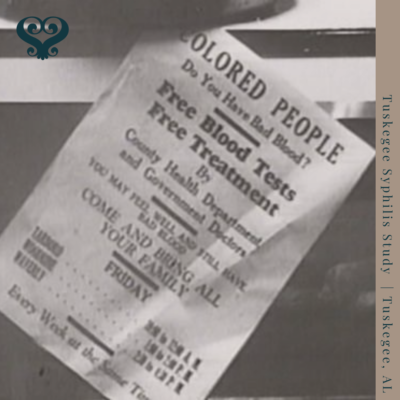It is a pleasant summer day on the campus of Tuskegee University. The green grass hasn’t yet peaked in color as it so often does in the later summer months. A bright red brick building stands tall with a black sign in the front which says: National Center for Bioethics Research and Health Care. A group of Black professionals walk through the building’s doors talking about the prospects of the Golden Tigers this upcoming season.
92 years ago, things would look quite different on this campus. Young Black students would be bustling around on this campus— a fairly uncommon sight during the Jim Crow era. Instead of Tuskegee University, the campus would be known as Tuskegee Institute, founded by the legendary educator, Booker T. Washington. There wouldn’t be as many buildings on campus, as a group of Black and white researchers hurry into a building with briefcases at their side.
In 1932, 600 Black men signed up for a free blood test with the promise they’d receive free services like meals, physicals, and burial insurance. Without consent, they were signed up for the “Tuskegee Study of Untreated Syphilis in the Negro Male,” conducted by the US Public Health Service (PHS) to examine the progression of untreated syphilis. Local health workers agreed not to treat the men in the study. Projected to last 6 months, the study would go on for over 40 years. Those in the study suffered significant mental and physical health issues. 15 years into the study penicillin became a known treatment for syphilis. They elected to continue the study.
The men of Macon County were from a region often referred to as the “Black Belt” because of its rich soil and vast number of sharecroppers who were the economic backbone of the region. Many of these men were told they had “bad blood,” a term used locally by people to describe a host of diagnosable ailments including syphilis. This thinking led scientists and medical professionals to believe that the Black men of Macon County were much more likely to contract STDs like Syphilis, making them prime subjects for medical experimentation by the PHS.
On this day in 1972, the Washington Star exposed the study, shutting it down shortly thereafter. The experiment led to deep, ongoing mistrust of public health officials and vaccines in the Black community. Following the end of the experiment, a class-action lawsuit was filed leading to an out-of-court settlement for $10 million. As a part of the settlement, the US government agreed to provide lifetime medical benefits and burial services to all living participants through the newly established Tuskegee Health Benefit Program. A year later spouses, widows and children of the study’s participants would be included in the program.

